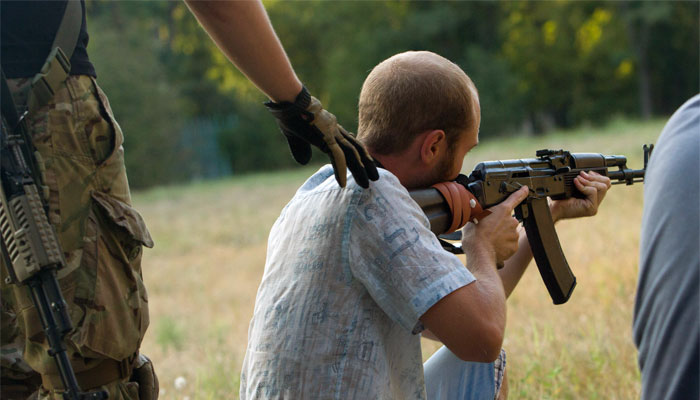Ukrainian servicemen from the Azov Battalion train volunteers on September 1, 2014 in the southeastern Ukrainian city of Mariupol
Reuters/Brussels/Kiev
European officials proposed sweeping new sanctions on Tuesday to starve Russia's companies of capital and technology as punishment for Moscow's intervention in Ukraine, where Kiev officials said Russia was bolstering an "invasion" force.
Western countries accuse Moscow of sending armoured columns of troops into Ukraine, where the momentum in a five-month war shifted last week decisively in favour of pro-Russian rebels, who are now advancing on a major port.
Russia denies its troops are involved in fighting on the ground, in the face of what Western countries and Ukraine say is overwhelming evidence.
According to the United Nations, the war, in which pro-Russian separatists are fighting to throw off rule from Kiev, has killed more than 2,600 people and driven nearly a million from their homes in east Ukraine.
European leaders asked the EU on Saturday to draw up new sanctions to punish Moscow, which are expected to be unveiled on Wednesday and adopted by Friday. The United States is also planning new sanctions but is keen to maintain Western unity by not getting in front of its European allies.
Outlining the new proposals on Tuesday, European diplomats described a number of mainly technical measures that would have the combined effect of making it harder for companies in Russia's state-dominated economy to obtain overseas financing.
U.S. and EU sanctions steadily tightened since March have already made it hard for many Russian firms to borrow, scaring investors and contributing to billions of dollars in capital flight that has wounded the Russian economy. Moscow has responded by banning most imports of Western food.
"We need to respond in the strongest possible way," said the EU's newly-named incoming foreign policy chief, Italian foreign minister, Federica Mogherini. "Things on the ground are getting more and more dramatic. We speak of an aggression, and I think sanctions are part of a political strategy."
Still, it is by no means clear that the sanctions will pass in their proposed form: the 28 EU member states must all agree on any measures, and several have openly expressed scepticism.
Czech Prime Minister Bohuslav Sobotka said he would study ways to reduce the harm to his country from sanctions, and seemed unconvinced by the entire strategy.
"The problem is that if sanctions are escalated now, there will be a reaction from Russia and we are not able to estimate at this point what impact the next wave of sanctions by Russia against EU countries will have," he said.

